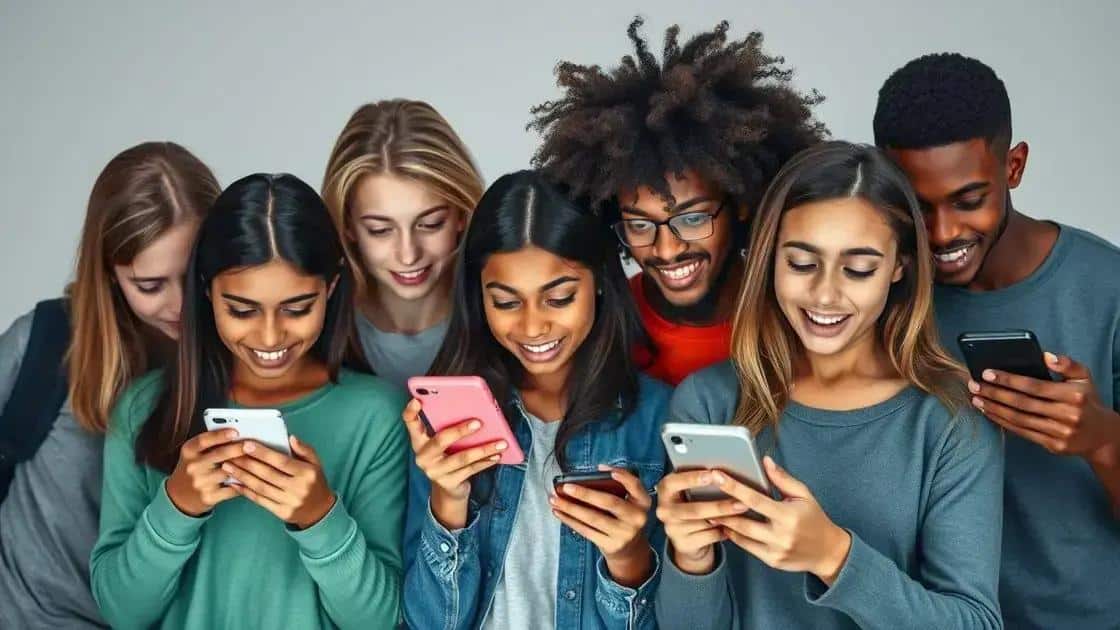Social media impact on youth mental health: a closer look

Anúncios
The impact of social media on youth mental health includes both positive aspects, like enhanced communication, and negative consequences, such as increased anxiety and cyberbullying, necessitating strategies for healthy online habits.
Social media impact on youth mental health is a crucial topic today. Have you ever wondered how the constant connectivity affects young minds? Let’s dive into the details and find out.
Anúncios
Understanding social media’s role in youth life
Social media has become a big part of many young people’s lives. It’s a place where they connect with friends, share ideas, and express themselves. But how does it affect them?
Understanding social media’s role in youth life is essential, especially as young people spend hours online daily. This constant use can lead to both positive and negative experiences. While social media helps build friendships, it can also create issues like anxiety or depression.
Anúncios
The Positive Aspects
Many young users find support and community through their online interactions. Social media platforms can help isolate teens connect with others who share their interests. Additionally, they allow for creativity and self-expression through posts and videos.
Key Benefits Include:
- Improved communication skills.
- Access to diverse perspectives.
- Opportunities for collaborations.
- A platform for sharing talents.
However, it’s important to be aware of the downsides. Not everything online is positive, and some experiences can be harmful. Studies show that excessive social media use may lead to feelings of loneliness and low self-esteem. Young people might compare their lives to others, leading to unhealthy pressures.
Challenges of Social Media
The challenges young people face are significant. Issues like cyberbullying, unrealistic expectations, and the addiction to likes can impact their mental health. It’s crucial for parents and educators to engage with youth about these topics. Open conversations can help guide them in navigating the online world safely.
In summary, social media plays a complex role in youth life. It offers a space for connection and creativity while also presenting challenges. Educating young people about these dynamics can promote healthier interactions.
The psychological effects of social media use

The psychological effects of social media use are extensive and can greatly influence both feelings and behaviors. Young users often experience a mix of emotions while interacting online. It’s interesting to see how these platforms can impact mental health in both good and bad ways.
To begin with, many young people feel joy and connectivity when they engage with peers on social media. This virtual interaction can promote strong social bonding. However, it can also lead to feelings of insecurity and anxiety.
Positive Psychological Effects
Despite some negative aspects, social media can have positive effects. It can serve as a support system for individuals feeling isolated. A few notable benefits include:
- Building community among peers with similar interests.
- Encouragement and empowerment from supportive comments.
- Sharing personal achievements for affirmation.
- Access to mental health resources and awareness.
On the flip side, the constant exposure to curated lives can lead to unhealthy comparisons. Young users might feel inadequate if their reality doesn’t match the perfection found in others’ posts. This pressure often results in low self-esteem or even depression.
Negative Psychological Effects
The challenges young users face due to social media are real and concerning. Cyberbullying is a significant issue, causing emotional pain and distress. Furthermore, it’s easy to fall into a cycle of seeking likes and validation. This can lead to addiction or compulsive behaviors where the need for social approval outweighs personal happiness.
Understanding these effects is vital for parents, educators, and teenagers themselves. Talking about mental health and social media openly can help mitigate negative consequences and foster a healthier online experience.
Strategies for promoting positive social media habits
Promoting positive social media habits among young users is essential for their mental well-being. It’s important to create an environment where social media is used responsibly and effectively. By focusing on specific strategies, we can help youths navigate their online experiences in a healthy way.
One helpful approach is encouraging active participation rather than passive consumption. This means teens should engage in conversations and create content rather than just scrolling. This can lead to a more fulfilling online experience.
Key Strategies Include:
- Setting time limits for daily social media use to prevent overexposure.
- Encouraging breaks from screens to enhance real-life interactions.
- Fostering discussions about the content they engage with, helping them analyze its impact.
- Promoting content that inspires, educates, and supports mental health awareness.
Another important strategy is teaching young people how to curate their feeds. Kids should be encouraged to follow accounts that uplift and educate, rather than those that might cause anxiety or self-doubt. By doing this, they can create a positive online space for themselves.
Building Resilience
Building resilience is another key part of promoting healthy social media habits. Teaching youth to manage negative feedback or cyberbullying can empower them to respond positively. Role-playing scenarios can be effective in preparing them for real situations they may encounter online.
Finally, it’s essential for parents and educators to be role models. By demonstrating balanced social media use and having open conversations about the online world, they can influence teens positively. This creates a supportive atmosphere that encourages healthy habits and critical thinking.
Resources for parents and educators

Providing effective resources for parents and educators is crucial in supporting mental health for young social media users. With the right information and tools, they can guide youth in navigating the digital world more safely.
First, it’s important to stay informed about the current trends in social media. Understanding which platforms are popular among teens allows adults to engage in meaningful conversations. Knowledge about these tools empowers them to discuss topics like privacy settings and online etiquette.
Helpful Resources Include:
- Webinars and workshops that focus on social media literacy.
- Books that address the impacts of social media on youth mental health.
- Websites dedicated to educating families about digital safety.
- Apps that allow parents to monitor social media usage while respecting privacy.
Additionally, there are many organizations providing support and information. Groups focusing on mental health education often have materials designed specifically for families. These resources help parents understand the emotional landscape of teenagers and provide tools for open dialogue.
Building Communication
Encouraging regular discussions about social media experiences can also be beneficial. Parents should create a safe space for their children to share feelings about their online interactions. This includes discussing any negative experiences, such as cyberbullying, and exploring coping strategies together.
Finally, fostering a healthy relationship with social media can help. Educators can implement programs in school that teach students about responsible online behavior. Teaching time management and self-regulation regarding social media use also plays a key role in encouraging positive habits.
FAQ – Questions about social media impact on youth mental health
What are the main psychological effects of social media on youth?
Social media can lead to both positive effects, like increased connection, and negative effects, such as anxiety and low self-esteem.
How can parents promote positive social media habits?
Parents can encourage open communication, set time limits for use, and teach kids to curate their feeds with uplifting content.
What resources are available for educators to address social media issues?
Educators can use workshops, books, and online resources to educate students about responsible social media use and mental health.
How does social media contribute to cyberbullying?
Social media can create a platform for cyberbullying due to anonymity and the reach of posts, making it important to discuss and address these behaviors.






